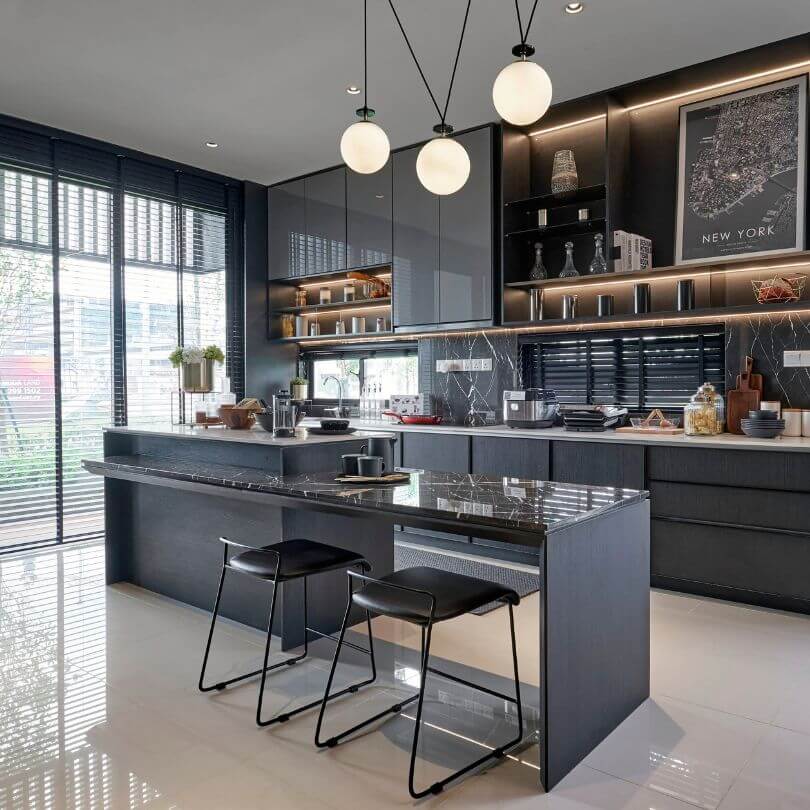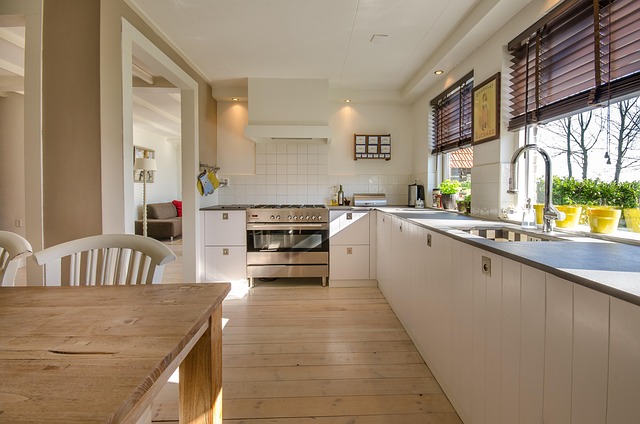Unlock Your Kitchen’s Hidden Harmony: 10 Feng Shui Secrets for a Happier Home
Feng Shui for the kitchen. I remember a lovely client, Amelia, who contacted me feeling utterly disconnected from her beautiful, newly renovated kitchen. It had all the bells and whistles, gleaming stainless steel, chic countertops, and state-of-the-art appliances. It looked stunning, but the moment you stepped in, you felt cold.
Yet, a wave of unease washed over her whenever she stepped inside to cook. She described it as feeling “cold” and “uninviting,” a stark contrast to the warmth she desired for her family’s gathering space. We sat down over a cup of tea. As she described her frustrations, it became clear that while the aesthetics were there, the vital energy, the warmth called chi, was somehow lost.
Think of it this way: making your kitchen feel good isn’t just about how it looks. It’s really about creating a peaceful and energetic space. Just like we helped Amelia bring positive energy and good Feng Shui into her kitchen, you can easily turn your cooking area into a place that genuinely feels good.

Let’s explore ten powerful Feng Shui tips for the kitchen that will help you cultivate a space where culinary creativity flourishes and positive energy abounds.
Elevate Your Kitchen’s Energy: 10 Feng Shui Secrets.
1. Let There Be Light: Optimising Illumination for Vibrant Energy Flow
Think about how different lighting affects your mood. Harsh fluorescent lights can feel sterile and draining, while soft, natural light uplifts and energises. In Feng Shui for the kitchen, light is a powerful tool to enhance the flow of chi.
- Maximise natural light by keeping windows clean and uncluttered. Introduce layers of artificial lighting. Bright task lighting for food preparation, softer ambient lighting for overall illumination, and perhaps a warm pendant light over your dining nook. Choose bulbs with a warm colour temperature to create an inviting atmosphere. Avoid harsh, direct overhead lighting.
Facts: Studies have shown that exposure to natural light can boost serotonin levels, improving mood and energy.
There are 25 simple ways to elevate your home’s energy. Find out what they are, and download your free feng shui tips!
2. Paint Your Mood: Choosing Calming Yet Vibrant Colours
Colours profoundly impact our emotions and energy levels. In Feng Shui for the kitchen, selecting the right palette is crucial for creating a harmonious environment.
- Opt for calming and nourishing colours like soft greens, representing growth and vitality, or warm yellows and creams, symbolizing nourishment and happiness. You can introduce vibrant accents through accessories like artwork, utensils, or a colourful fruit bowl. Avoid overly aggressive reds or stark, cold blues that can feel unsettling in a kitchen space.
Resource: Explore colour psychology charts to understand the energetic associations of different hues.
3. The Heart of the Home: Mindful Placement of the Stove
In Feng Shui, the stove is considered the heart of the home, representing wealth, nourishment, and vitality. Its placement is paramount for a prosperous and healthy household.
- Ideally, the stove should have a solid wall behind it, providing support and security. Avoid placing it directly facing the kitchen door, as this can symbolize wealth and energy flowing straight out. Also, avoid having the stove directly under a window, which can weaken its energy. Be mindful of the “fire and water clash”. Keep the stove separated from the sink and refrigerator, as these opposing elements can create disharmony.
Need guidance on applying Feng Shui principles to your unique home? Let’s chat! Schedule your complimentary 15-minute call for expert advice.
4. Breathe Life In: Incorporating Living Plants and Fresh Herbs. Feng Shui for the Kitchen
Introducing living greenery into your kitchen brings in the vibrant “wood” element, promoting growth, vitality, and a connection to nature.
- Place potted plants on windowsills (ensure they receive adequate light), shelves, or countertops. Fresh herb gardens add a lovely aroma and flavour to your cooking and infuse the space with fresh energy. Choose low-maintenance, air-purifying plants like peace lilies or snake plants. Ensure your plants are healthy and thriving, as wilting plants can have a negative impact.
Fact: A NASA Clean Air Study found that certain indoor plants can effectively remove toxins from the air.

5. Balancing Act: The Five Elements for Kitchen Harmony
Feng Shui principles revolve around balancing the five elements: Wood, Fire, Earth, Metal, and Water. Achieving this balance in your kitchen is key to creating a harmonious and supportive environment.
- Observe how each element is represented in your kitchen. Wood can be present in wooden cabinets or plants. Fire is the stove. Earth can be represented by ceramic tiles or earth-toned decor. Metal is found in appliances and metallic accents. Water is the sink and the refrigerator.
- Introduce elements to create better equilibrium if an element feels dominant or lacking. For example, suppose you have a lot of stainless steel (metal). You might introduce wood elements through cutting boards or wooden utensils in that case.
Discover the secrets to a harmonious home. Download your FREE ebook: 25 Feng Shui Tips You Need to Know!
6. Fresh Air Flow: Keeping the Kitchen Well-Ventilated
Stagnant air can lead to stagnant energy. Good kitchen ventilation is crucial in Feng Shui to ensure a healthy and vibrant atmosphere.
- Use your range hood regularly while cooking to remove fumes and odours. Open windows whenever possible to allow fresh air to circulate. Consider using an air purifier if ventilation is limited. A fresh and clean environment promotes a positive flow of chi.
7. Out of Sight, Out of Mind: Storing Knives and Sharp Objects Discreetly
In Feng Shui, exposed sharp objects can create “poison arrows,” emitting negative energy and potentially causing tension or conflict.
- Store knives in a knife block, drawers, or on a magnetic strip placed out of immediate sight. Handle sharp objects with care and intention. Keeping them tucked away creates a softer and more harmonious energy in your kitchen.
8. A Bowl of Plenty: Placing Fresh Fruit for Abundance
A bowl of fresh, vibrant fruit is a simple yet powerful Feng Shui remedy for attracting abundance, nourishment, and good health to your kitchen.
- Place a colourful bowl of fresh fruit on your countertop or kitchen table. The round shapes and vibrant colours symbolize prosperity and vitality. Regularly replenish the fruit to keep the energy fresh and flowing.
9. Swift Solutions: Repairing Leaks and Maintaining Appliances Promptly
In Feng Shui, leaks are seen as a drain on your wealth and energy. Malfunctioning appliances can also disrupt the harmonious flow of chi.
- Address any leaks, no matter how small, immediately. Ensure all your appliances are in good working order. Promptly repair or replace anything that is broken. Maintaining a well-functioning kitchen symbolises care and attention to your well-being and prosperity.
10. The One-Minute Rule: Decluttering for Clarity
Clutter obstructs the flow of chi and can create feelings of overwhelm and stagnation. Implementing simple decluttering habits is essential for good Feng Shui in the kitchen.
- Adopt the “one-minute rule” If something takes less than a minute to put away, do it immediately. Regularly clear out unnecessary items from countertops, cabinets, and drawers. Wash dishes promptly and keep the sink clear. A clean and organised kitchen promotes a clear and positive energy flow.
Ready to transform your kitchen into a vibrant and nourishing sanctuary? Download my free ebook, “25 Feng Shui Tips for a Harmonious Home,” for more in-depth guidance and practical advice!
Frequently Asked Questions about Feng Shui for the Kitchen
1. Is the direction my kitchen faces essential in Feng Shui?
Yes, the direction of your kitchen can influence the energy. Generally, a northwest-facing kitchen is considered less favourable as the metal energy of the northwest can clash with the fire energy of cooking. However, this is just one factor, and other Feng Shui elements can be adjusted to mitigate potential adverse effects.
2. I have an open-plan kitchen. How can I apply Feng Shui principles?
It’s important to define the kitchen area visually in an open-plan layout. You can use rugs, changes in flooring, or even strategically placed furniture to create a sense of separation. Pay extra attention to the placement of the stove and ensure it has a supportive backing.
3. What if my stove is directly facing the door? Is there a remedy?
If your stove faces the door, you can try to redirect the energy flow. Place a screen or a decorative element between the door and the stove. You can also hang a small, auspicious object above the furnace to deflect negative energy.
4. I have limited space in my kitchen. Can I still incorporate Feng Shui?
Absolutely! Feng Shui is about intention and mindful arrangement, not necessarily about having ample space. Focus on keeping the area clean and decluttered, optimising lighting, and incorporating small touches of the five elements. Even a single healthy plant or a bowl of fresh fruit can make a difference.
5. How often should I declutter my kitchen according to Feng Shui principles?
Regular decluttering is key. Aim for a daily tidy-up (following the one-minute rule) and a more thorough decluttering session at least once a month. That helps to keep the energy fresh and prevents stagnation.

